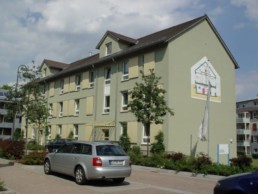
Photo credit: BASF
Originally built in the 1930s to house workers from the nearby BASF chemical plant in Ludwigshafen, Brunckviertel consists of 500 homes, most of which are in blocks containing multiple flats. These underwent extensive energy renovation over a ten-year period and achieved energy savings in the range from 70 to 85%
Addressing the energy waste in all dwellings throughout Brunckviertel, the ten-year energy renovation project achieved savings of around 8,300 tons of CO2 emissions and – depending on the type of building – between 70 and 86% of the energy demand.
Ludwigshafen am Rhein is a city in Rhineland-Palatinate, Germany, on the river Rhine. Known primarily as an industrial city, Ludwigshafen is the home of chemical giant BASF and other companies. The motivation for undertaking the energy renovation arose from the out-of-date layout of the original apartments, which had made them unpopular with tenants and had led to a low occupancy rate. The renovation works were holistic and saw the improvement of the building envelope and the mechanical systems with the buildings. The Project was one of the Best-Practice-Models of the EU Project SUREURO (Sustainable Refurbishment Europe).
Principle Characteristics of the Renovation Works:
| Ownership type: | Private housing company |
| Year of construction: | 1930s (rebuild after WW2 starting 1951) |
| Renovation completed: | 2006 |
| Floor area after works: | Approximately 48,000m² (800 dwellings in the 50s, after renovation 500 dwellings) |
| Structure: | Load-bearing brick wall (the old brick from the 1930s was reused, because of lack of building materials after the way) to which an ETICS insulating system was added. Windows were replaced and heat exchange ventilation introduced (though not in all buildings) as well as new balconies and modified layouts within the apartments |
| Heating and energy: | Originally heated using oil-fired boilers, the area is now connected to a district heating system that makes extensive use of recovered heat from nearby industrial processes |
| Energy performance: | Depending on the building type, savings in the range 70 to 85% were achieved |
| Cost of works: | €50 million project cost for the whole renovation project (including new office building for BASF Wohnen u. Bauen) |
| Architect: | Planning Team of BASF Wohnen und Bauen (formerly LUWOGE) |
| Technical consultants: | BASF Technical Services |
BASF website post about the Brunckviertel renovation project: https://neopor.de/portal/basf/en/dt.jsp?setCursor=1_1224457
This report entitled ‘Renovation and improvement of energy efficiency in buildings: Policies and techniques in the European environment’ from World SB14 Barcelona includes the Brunckviertel project as an example: http://wsb14barcelona.org/programme/pdf_poster/P-002.pdf
